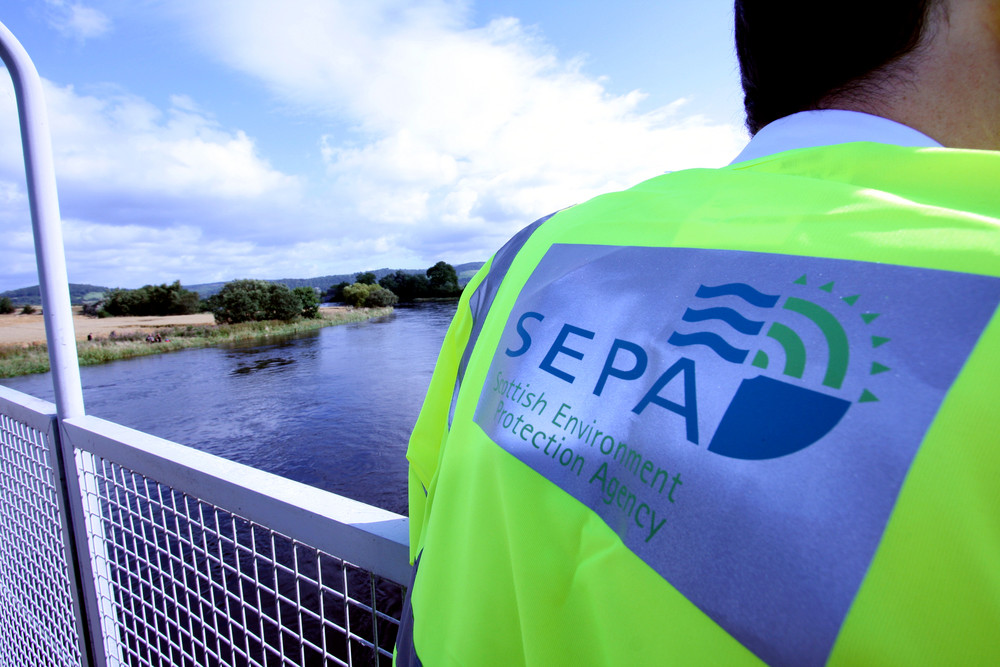The company that supplies Scottish farmed salmon to the retail giant, Marks and Spencer (M&S), has been officially reprimanded for misreporting toxic pesticide use at 25 fish farms over three years.
Documents seen by The Ferret reveal that Scottish Sea Farms was sent two final warning letters by the Scottish Environment Protection Agency (Sepa) in February 2020 for under-reporting, or failing to report, the use of chemicals to kill the lice that can plague caged salmon.
Sepa accused the company of supplying information that “was not true and accurate” in 2015, 2016 and 2017. This was a “serious matter”, Sepa said, and any further breaches could result in prosecution.
The reprimand from Sepa led to the Royal Society for the Prevention of Cruelty to Animals (RSPCA) also sending Scottish Sea Farms a formal warning letter in October 2021. The charity was “extremely concerned” and said the company had breached its membership agreement with the RSPCA Assured fish welfare certification scheme.
According to Scottish Sea Farms, there had been a “basic administrative error” which it had owned up to and rectified. The company stressed there had been “no misuse of medicines, no negative environmental impact and no threat to fish welfare”.
M&S agreed there had not been environmental harm. But it criticised Scottish Sea Farms for having “fallen short of the best practice reporting principals expected of all M&S suppliers”.
Environmental and community groups described the revelations as “concerning” and “sickening”, pointing out that the pesticides ended up in the sea where they could harm wildlife. The regulatory regime governing the £1 billion salmon farming industry had been “fatally undermined,” said one campaigner.
Sepa’s enforcement action came to light in more than 400 documents released at the end of September 2021 after a 10-month freedom of information battle by fish farming campaigner, Corin Smith.
The documents disclose results of an “audit and unannounced inspection programme” of salmon farms launched by Sepa in 2018, following concerns about the impact of pesticides on marine wildlife.
Salmon reared in cages in lochs around Scotland have often been bathed in pesticide solutions to try and rid them of the sea lice that eat them alive.
Sepa sent two final warning letters to Scottish Sea Farms on 14 February 2020. They said the audit had discovered that information on the use of two pesticides, azamethiphos and deltamethrin, had not been reported or was “incorrect”.
According to the chemical data sheet on Sepa’s website, azamethiphos is “very toxic to aquatic life with long lasting effects”. The industry data for deltamethrin describes it as “toxic” to crabs and lobsters.
Sepa’s letters pointed out that failing to accurately report chemical use was an offence under the Water Environment (Controlled Activities) (Scotland) Regulations 2011.
“Sepa considers that for several sites there have been instances of misreporting over a three year period whereby either not all the information required to be reported has been done so, or the reported information was not true and accurate,” the letters said.

Sepa acknowledged the cooperation of Scottish Sea Farms, its “prompt internal investigation” and its explanation of the circumstances. “Nonetheless Sepa consider the historical inadequate records management and subsequent misreporting over several years, specifically in relation to prescription medicines, to be a serious matter,” the letters continued.
Any further breaches would be “likely to result in enforcement action” which “could include the submission of a report to the Procurator Fiscal recommending prosecution”, Sepa said.
Sepa’s letters identified 25 individual fish farms run by Scottish Sea Farms in Shetland, north west Scotland and Argyll where misreporting had occurred. Azamethiphos treatments were “under reported” or “not reported” at all of them, while deltamethrin treatments were misreported at two.
M&S has a “long-standing partnership” with Scottish Sea Farms and sources salmon from a selection of the company’s farms. At least six of the farms listed by Sepa as breaching reporting requirements have been named on M&S packaging in 2018, 2019 and 2020.
Sepa’s final warning letters to Scottish Sea Farms were passed to the RSPCA on 12 October, shortly after they were released. The salmon company is a member of the charity’s scheme aimed at ensuring high standards of fish welfare.
“We were extremely concerned by this allegation of a standard breach in February 2020 and immediately launched an investigation,” Neil Scott, head of certification at RSPCA Assured, told The Ferret.
“Our investigations confirmed that the member had breached the RSPCA welfare standards and terms of the RSPCA Assured membership agreement. As such, we issued the member with a formal warning letter in line with our sanctions policy.”
Scott added: “Failure to notify us of any similar future events may result in a review of the certification of some or all of their sites. Whilst serious, these historical breaches date back to 2014 and we are satisfied that they did not pose a direct threat to fish welfare.”
M&S stressed it was committed to maintaining the highest animal welfare. “Our aquaculture team and our partners at RSPCA Assured swiftly launched an investigation into the Sepa notifications issued,” said a spokesperson for the retailer.
“Whilst Scottish Sea Farms has fallen short of the best practice reporting principals expected of all M&S suppliers, we are satisfied that this breach did not impact or threaten fish welfare or cause any negative environmental impact.”
There is no story here other than a basic administrative error that has long since been rectified.
Anne Anderson, Scottish Sea Farms
Scottish Sea Farms accepted there had been an “historical administrative error” but emphasised the lack of environmental harm. “Of uppermost importance is that all veterinary medicines were procured, used and recorded in accordance with our various farming licences,” said the company’s head of sustainability, Anne Anderson.
“The administrative error — which we identified ourselves during an internal review, proactively notified Sepa of, and rectified — was that not all records made it into our annual submission.”
She added: “As an extensive Sepa audit subsequently found, there was no misuse of medicines, no negative environmental impact and no threat to fish welfare. Therefore there is no story here other than a basic administrative error that has long since been rectified.”
The campaigner, Corin Smith, obtained the documents from Sepa after an appeal to the Scottish Information Commissioner. He runs the Inside Scottish Salmon Feedlots website which attacks fish farms for “destroying Scotland’s marine eco-systems”.
Smith argued that failing to report the use of hazardous pesticides was a grave offence. “For Scottish Sea Farms to have been caught doing so at dozens of salmon feedlots, over a number of years, fatally undermines the regulatory framework in Scotland,” he said.
“How can we trust that anything they report is true ever again? Yet, the only consequence of these incredibly serious offences for this multi-billion dollar family-owned Norwegian company is a letter.”
It is sickening to see that for years many farms run by Scottish Sea Farms had not even reported when or how often they were dumping this pollution.
John Aitchison, Coastal Community Network
The Coastal Communities Network in Scotland, which brings together 19 groups concerned about the marine environment, warned that fish farm pesticides were dumped in the sea where they could kill crabs, prawns and lobsters.
“It is sickening to see that for years many farms run by Scottish Sea Farms had not even reported when or how often they were dumping this pollution,” said the network’s John Aitchison.
“If companies cannot be trusted to do what their licences say, they should be stopped from using pesticides at all. It is time to end all discharges of pesticides from fish farms.”
The National Trust for Scotland said that non-compliance with the current regulatory regime was “concerning”. The Ferret’s revelation “strengthens our concerns over proposals to increase the scale of fish farms and place them in new locations without first addressing these fundamental problems,” said the trust’s head of public policy, Diarmid Hearns.
The Scottish Greens urged Sepa to “take action” on these “serious breaches” of environmental standards. “The future of Scotland’s reputation as a quality food producer is in serious jeopardy unless our fish farms start taking animal welfare and environmental sustainability much more seriously,” said the party’s environment spokesperson, Mark Ruskell MSP.
The Scottish Environment Protection Agency said that it had audited thousands of records of pesticide use at four fish farming companies in 2018. At two no issues were found.
At Scottish Sea Farms there was no evidence of illegal discharges or environmental harm but “officers did find a systemic error in reporting,” said the agency’s senior manager, Stuart Baird.
“Scottish Sea Farms engaged fully with Sepa officers and took swift action to remedy the issue. Sepa takes the accurate reporting of data seriously, which is why it served a final warning letter on the company.”
Sepa was still “in the process of concluding” its audit of another company, Mowi, which had been delayed by Covid restrictions and a criminal cyber attack.
Mowi described Sepa’s concerns as administrative. “Mowi has been advised by Sepa that no warning letter will be issued in relation to this audit,” said the company’s chief operating officer, Ben Hadfield.
“While Mowi has not agreed with some of the allegations made about our company’s performance, we are committed to fully cooperating with Sepa to ensure its administrative concerns are addressed.”
In August 2021 the Scottish Government announced an independent review of how fish farms are regulated, led by professor Russel Griggs. “Our programme for government commits us to delivering a sustainable aquaculture sector which places an enhanced emphasis on environmental protection and community benefits,” said a government spokesperson.
Final warning letters from the Scottish Environment Protection Agency
This story was published in tandem with The Sunday Times. Cover image thanks to Corin Smith.















Fish farms get away with pretty much anything, they mostly supervise themselves and if caught doing something wrong only get a smack on the back of the hand. It is time for fish farms to be on-shore.